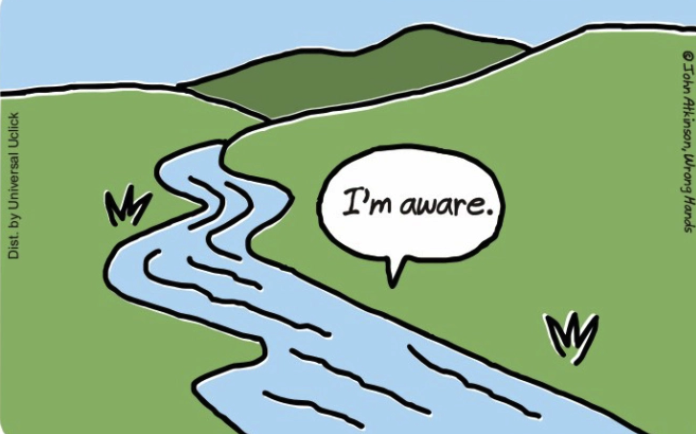“Green” has become the buzzword of the past few years. It appears on laundry detergent boxes, jumps out of air conditioning advertisements, and shouts from grocery store aisles. As an environmentalist, I see this new spark of enthusiasm for conservation as a step in the right direction. Solar panels aren’t just for hippies anymore! Recycling bins are everywhere! And even Priuses are becoming cool(er)!
What unsettles me, though, is the exploitation of the eco-fad. Clever wording that skirts around the truth lures in customers with promises of a lightened environmental conscience. Companies pose their products as friendly for the earth, when in reality they are often taking advantage of loose regulations. Organizations tout their carbon friendliness but fail to deliver real energy-saving results. This widespread phenomenon has earned the term “greenwashing.” As educated people, it’s important that we see beyond the presentation and understand the truth.
To begin, let’s talk about the food industry. Organic food has increased in popularity in the 21st century, and public opinion still varies. Some see organic meat and vegetables as over-hyped and over-priced, while others refuse to eat anything else. Whether or not you prefer food marked with the trademark green-and-white sticker, knowing the meaning of the word is important. The U.S. Department of Agriculture (USDA) defines “organic” as (get ready for a mouthful): “a labeling term that indicates that the food . . . has been produced through approved methods that integrate cultural, biological, and mechanical practices that foster cycling of resources, promote ecological balance, and conserve biodiversity.” Though wordy, the definition seems to encourage a holistic and sustainable approach to food production. As the market for organic goods has grown, however, big businesses have stretched the regulations. Many small farmers have now abandoned organic standards for the “Certified Naturally Grown” label, a farmer-to-farmer certification that ensures sustainable production.
Nowhere is greenwashing more ubiquitous than in the egg industry. It seems like every time I walk down the dairy aisle in a grocery store there’s a new phrase on egg cartons. The syntax sounds wholesome and pleasant, but under scrutiny doesn’t mean anything. Free-range eggs stand as the biggest illusion in the group. According to USDA standards, the hens must be provided shelter, food, and fresh water, as well “continuous access to the outdoors.” This “access” can be deceiving, because the area “may or may not be fenced and/or covered by a netting-like material.” Free-range does not mean plenty of space for chickens to roam in fresh air and sunshine. It merely requires farmers to provide some sort of opening in the chickens’ shelter – theoretically, “free-range” chickens may never leave their coop.
Other than free-range eggs, most phrases don’t represent a regulated standard. The USDA classifies these as “voluntary labels.” You’ve probably come across “cage-free” or “(all) natural” eggs. “Cage-free” is similar to free-range, but isn’t regulated by the USDA. It stipulates that the flock was able to freely roam within an enclosed area. Again, this could merely mean – and often does – a crammed chicken house. For the consumer, the similarity of these catchphrases adds to the confusion. “All natural” means absolutely nothing. It’s just two words put together to make sounds. Don’t be fooled!
Then there’s the classic phrase “all vegetarian diet.” Ideally, chickens should forage, eating grass and small bugs for nutrition. Our agricultural system has made it financially possible to replace this diet with one consisting primarily of corn and soybeans. This is not only an unnatural diet for the chickens. It also supports the environmentally destructive corn and soy industries, famous for their extreme overuse of chemicals and mono-cropping (growing only one crop on a plot of land). It’s a vicious cycle, and one that profits only a handful of powerful corporations instead of the animals and the earth.
One my favorite examples of greenwashing is Lay’s Chips. Many of you have probably read the blurb on the back of their bags of crunchy fried potatoes. Let’s listen to how they describe their production method. To quote the back of a Salt & Vinegar flavored variety, “Naturally Delicious! It all starts with farm-grown potatoes – cooked in all natural oil with a dash of salt. Then we add just the right balance of tangy, all natural vinegar. So every LAY’S® potato chip is perfectly crispy and delicious. Happiness in Every Bite.®” Well isn’t that swell. First off, farm-grown potatoes?!! What does that even mean?! Where else would potatoes be grown? Second, the ingredient list has a different story to tell about that “all natural vinegar,” (there’s that phrase again) which actually contains maltodextrin, “natural flavors” (uh oh), salt, malic acid, and vinegar. Turns out there’s actually happiness AND chemicals in every bite! Lay’s, you should be ashamed.
Greenwashing is not only prevalent in agriculture – it has invaded popular culture too. Ever noticed Coca-Cola’s “plant bottle?” According to the company, up to thirty percent of the bottle is “made from plants,” and in advertisements the bottle is shown glistening with water droplets as it emerges from the tender green leaves of a young seedling. I suppose that it’s better to reduce the amount of plastic (produced from petroleum) in Coke products. On the other hand, the bottle belies its company’s general lack of concern for the environment. Coke should focus instead on changing their water sources. Instead of syphoning groundwater from communities around the United States, they should try investing in sustainable rainwater purification.
As the wise Kermit the Frog once said, “It ain’t easy bein’ green.” How prudent he is. It is difficult to navigate the overwhelming amount of “green” these days. Next time you’re watching TV or walking through Publix, keep an eye out for deceptive packaging. Do a little more research, dig deeper into what you’re actually buying. Remember that each purchase is a vote and sends a message. Next time you catch yourself adding a case of bottled water to your cart, think of Hermit’s smiling green face. I think the right thing to do will become clear.
With this, dear readers, I leave you for the great land of college. I wish all of you the very best, and I hope that wherever your lives take you, you continue to keep the Earth in mind.


